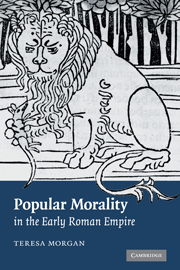Book contents
- Frontmatter
- Contents
- Preface
- List of illustrations
- List of tables
- List of abbreviations
- 1 Introduction
- PART ONE
- 2 Proverbs
- 3 Fables
- 4 Gnomai
- 5 Exempla
- 6 Patterns
- PART TWO
- PART THREE
- Conclusion
- Appendix 1 The political and literary connections of Babrius
- Appendix 2 The definition of a miscellany
- Appendix 3 Popular morality and philosophical doctrine
- List of papyri
- Bibliography
- Index
6 - Patterns
Published online by Cambridge University Press: 27 October 2009
- Frontmatter
- Contents
- Preface
- List of illustrations
- List of tables
- List of abbreviations
- 1 Introduction
- PART ONE
- 2 Proverbs
- 3 Fables
- 4 Gnomai
- 5 Exempla
- 6 Patterns
- PART TWO
- PART THREE
- Conclusion
- Appendix 1 The political and literary connections of Babrius
- Appendix 2 The definition of a miscellany
- Appendix 3 Popular morality and philosophical doctrine
- List of papyri
- Bibliography
- Index
Summary
For man
is in this world as in a
ship that is crossing the
great ocean and seems
to be breaking apart.
ZoharIn this chapter we draw together the main threads of the argument so far, in order to see more clearly the shape of early imperial popular morality. A number of topics have emerged as important in all four genres. Most of them can be divided broadly into two spheres: the relationship between human life and the metaphysical, including the gods and forces like fate and fortune, and the relationship between human beings in ‘public’ (i.e. not domestic) life. In these spheres, ethical agents find the greatest potential for moral conflict, debate and action. Between them, they describe what we can call with some confidence a system – a system informal, largely unintellectualized and less than wholly watertight, but nevertheless discernible and accessible to analysis.
The degree of agreement across the range of sayings and stories is striking and significant, and allows us to talk of a genuinely popular morality in the early Empire – popular in the sense that it travelled widely both up and down the social scale, and across place and time. At the same time, there are differences of opinion and emphasis within and between genres, which are significant in two ways. First, they allow us to see how morality alters incrementally up and down the social scale.
- Type
- Chapter
- Information
- Popular Morality in the Early Roman Empire , pp. 160 - 190Publisher: Cambridge University PressPrint publication year: 2007



